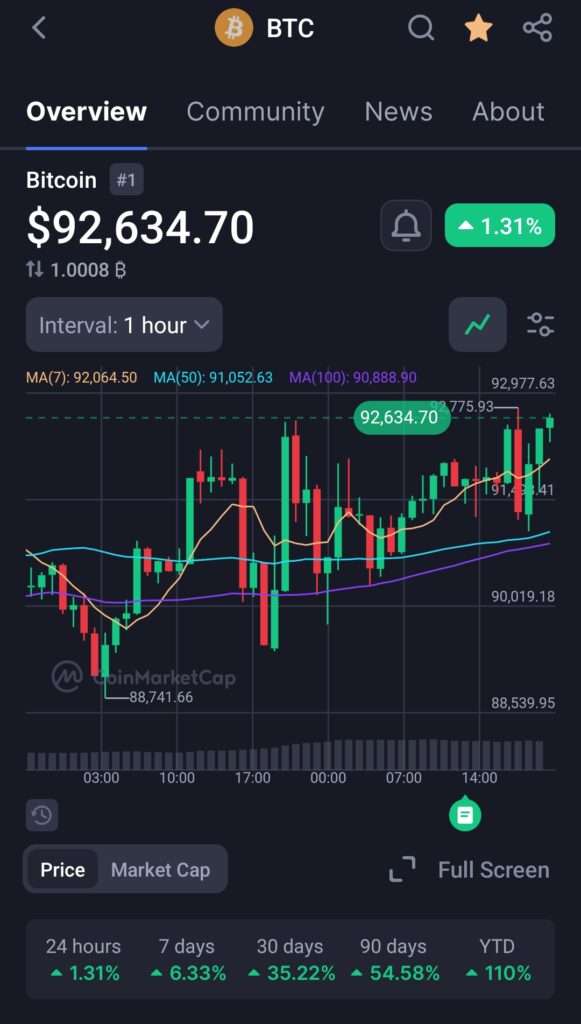The entrance of Spot Bitcoin ETFs marks a monumental step for the crypto world in pushing further towards mainstream and Institutional Bitcoin adoption. But why does this matter so much, and how does this impact the broader cryptocurrency market?
What is a Spot Bitcoin ETF?
A spot Bitcoin ETF news is simply an exchange-traded fund that tracks the price of the digital currency directly. While futures-based ETFs draw their value from bitcoin futures contracts, a spot ETF owns the actual cryptocurrency. This allows investors to take on risk exposure over the price of Bitcoin without directly owning or managing that asset.
The Game-Changers in Spot Bitcoin ETFs
Spot Bitcoin Exchange-Traded Funds mark a groundbreaking development in the financial world. ETFs have been a popular investment vehicle for a long time, offering diversified, regulated, and simplified trading. However, Bitcoin futures ETFs were introduced in 2021, with the disadvantages of being expensive and indirectly exposed. The emergence of spot Bitcoin ETFs, holding Bitcoin directly as their underlying asset, provides a more transparent and efficient option for both retail and institutional investors. It may be the beginning of a new chapter in cryptocurrency history by bridging the gap between traditional finance and the burgeoning digital asset space. In this essay, we discuss why spot Bitcoin ETFs matter, their implications for investors, regulatory challenges, and the broader impact on the global economy.
Democratization of Bitcoin Investment for Retail and Institutional Investors
Spot Bitcoin ETFs are expected to democratize Bitcoin investment, making it accessible to a wider audience. Previously, investors had to navigate complex processes, including setting up cryptocurrency wallets, understanding blockchain security, and managing private keys. Spot ETFs remove these hurdles, enabling people to buy Bitcoin through familiar brokerage accounts. And they also address institutional investors who were reluctant to take part in unregulated or lesser-known crypto markets. Now with the support of well-known financial institutions such as BlackRock and Fidelity for these ETFs, products bring a degree of credibility and trust to Bitcoin investment. This accessibility might drive higher adoption, thus pushing the price of Bitcoin and making it a more mainstream asset.

Market Stabilization and Liquidity Boost
The advent of spot Bitcoin ETFs is going to greatly improve market stability and liquidity. Unlike Bitcoin futures ETFs, which are based on derivative contracts and may result in price misalignments, spot ETFs purchase and hold Bitcoin outright. This direct link to the asset ensures that ETF trading reflects the actual Bitcoin market prices, thereby reducing volatility. As ETFs accumulate Bitcoin to match investor demand, they increase liquidity in the market. Institutional-grade liquidity inflows can dampen the wild price swings historically associated with Bitcoin, making it more attractive to conservative investors. In addition, the persistent buying pressure from spot ETFs may lead to long-term price appreciation for the benefit of all Bitcoin holders.
Regulatory Hurdles and Their Consequences

Although promising, spot Bitcoin ETFs have significant regulatory challenges, especially in countries like the United States. The SEC has been delaying or denying applications for spot Bitcoin ETFs due to concerns over market manipulation, investor protection, and the lack of comprehensive oversight in crypto exchanges. Successful approvals in other countries, such as Canada and Europe, highlight the feasibility of these products. The eventual approval of spot Bitcoin ETFs in major markets like the U.S. would not only address regulatory uncertainties but also set a precedent for other cryptocurrencies. It would signal a shift toward greater acceptance of digital assets within traditional financial systems, potentially paving the way for innovations like Ethereum ETFs or multi-asset crypto funds.
Broader Economic Impact and Future Outlook
The ripple effects of spot Bitcoin ETFs are not limited to the crypto market but instead have a significant impact on the global economy and financial systems. By integrating Bitcoin into regulated financial markets, such ETFs could accelerate the adoption of blockchain technology in industries. For instance, businesses may start to perceive Bitcoin not only as a speculative asset but also as a legitimate store of value or medium of exchange. More importantly, the progressive crypto regulations of countries would attract investments, boosting their economies. On a macroeconomic level, legitimizing Bitcoin may challenge the traditional assets such as gold, thus changing the game of global asset allocation. In the future, the success of spot Bitcoin ETFs might inspire the creation of similar products for other cryptocurrencies, further changing the investment landscape.
1. Institutional Inclusion: Regulated entry points offering access to spot Bitcoin ETFs impect 2024 will attract institutional investors who otherwise would have shunned the space due to volatility and a lack of regulation.
2. Increased Market Liquidity The entry of more diversified investors to the market through these ETFs is more likely to contribute toward increasing market liquidity over time, stabilizing prices.
3. Regulatory Clarity: The sanction of such cryptocurrencies ETFs brings out the signal of increasing acceptance of cryptos towards regulators, hence growing into an adult and trustworthy ecosystem.
4. Mainstream Accessibility: For any retail investor, spot ETFs negate management problems regarding private keys, wallets, and dealing with exchanges.
Price Effects for Bitcoins

Traditionally, launching such financial instruments had been marked by price rallies. For instance, Bitcoin all-time high at $69,000 in 2021 was partly fueled by the approval of Bitcoin futures ETFs. Spot ETFs could similarly usher in considerable inflows of capital into Bitcoin and drive their prices even higher.
Potential Risks
The benefits are significant, but investors must remain prudent:Price Manipulation: Increased institutional control may be manipulated to dictate prices.Over-Reliance on ETFs: Overdependence on these products could detach Bitcoin’s value from its decentralized ethos.Regulatory Hurdles: Not all regions may embrace spot ETFs, leading to uneven adoption.
Conclusion
Spot Bitcoin ETFs are more than just another financial product; they represent a critical juncture in the development of cryptocurrency and traditional finance. They bring two worlds, previously so disparate, closer together by providing direct exposure to Bitcoin. These ETFs improve market dynamics and pave the way for further adoption of digital assets by offering greater accessibility. While regulatory challenges remain, the growing demand and institutional interest in spot Bitcoin ETFs suggest that their widespread acceptance is only a matter of time. As we stand on the cusp of this new era, it is clear that spot Bitcoin ETFs matter more than most realize — not just for crypto enthusiasts but for the future of global finance.




One Comment